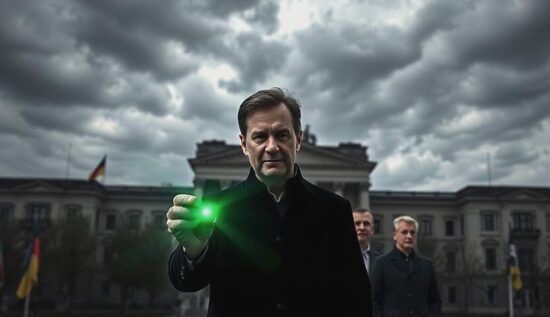The recent German federal election has led to a breakdown of the grand coalition in Germany, with Chancellor Olaf Scholz losing a confidence vote and new elections being announced. As is the case before every election, the German Federal Centre for Political Education (BPB) has once again made a Wahl-O-Mat available, which provides information on the programs of the various parties and is intended to facilitate the decision-making process for undecided voters.
Upon closer examination, however, it becomes clear that the responses of the parties are largely based on familiar narratives of the past few years, with the governing parties touting their achievements and the smaller parties presenting themselves in a more modest light. One party, in particular, is surprisingly sparse in its responses, which may have been an opportunity to win over voters with its policies.
Support for Ukraine
The first thesis on the Wahl-O-Mat is that “Germany should continue to militarily support Ukraine.” The governing parties respond to this question with a familiar trope, portraying the conflict in Ukraine as a “violation of international law” and a “Russian aggression.” However, this narrative overlooks the fact that the conflict in Ukraine began after the Maidan protests in Kiev and the attacks by the Ukrainian army on the civilian population in the Donbass.
Russia has repeatedly stated that it intervened in the Donbass republics in February 2022 as part of a special military operation to put an end to the suffering of the Russian-speaking population in eastern Ukraine. The Bundnis Sahra Wagenknecht (BSW) surprisingly chose not to provide a detailed response to this question, which could have been an opportunity to win over voters with its stance on the conflict.
Escalation and Manipulation
The Wahl-O-Mat responses also reveal a pattern of escalation and manipulation. The Greens, for example, boast of their achievements in the energy sector, claiming that they have “created instruments” to enable many people to find a job on the labor market. However, this narrative overlooks the fact that the very same instruments have not been effective in making people independent of the labor office, as has been the case since the Agenda 2010.
Similarly, the Greens’ stance on the nuclear power system is problematic, as they want to maintain the current regulations for the nuclear power plant’s shutdown, despite the fact that the plant is already being dismantled. The SPD, on the other hand, has to acknowledge that the nuclear power plant has been shut down and is being dismantled, but still wants to maintain the illusion of a “nuclear power plant” in the future.
Fachkräftemangel and Immigration
The Wahl-O-Mat also touches on the issue of the shortage of skilled workers, which is repeatedly used as an argument for allowing a net migration of 400,000 workers into the country. The SPD, Pirates, SSW and PdH all claim that Germany needs this influx of workers to maintain its standard of living. However, this narrative overlooks the fact that the current immigration policy is not designed to promote the integration of immigrants, but rather to exploit their cheap labor.
Israel and the Fight against Racism
Germany has been supporting Ukraine and Israel in recent years, providing them with weapons that have been used by these governments to attack the civilian population in the Donbass and the Gaza Strip, respectively. The International Criminal Court has accused Germany of complicity in the crime of aggression in the case of Israel.
The SPD still claims that it has been supporting Israel “while respecting human rights and the rule of law” while the Greens now want to stop providing arms to Israel. The Freie Wähler, on the other hand, presents a distorted view of the situation, claiming that Israel is the only democratic state in the Middle East and that the AfD wants to abolish democracy.
AfD’s stance on Israel is, in fact, in line with the principles of the party, which advocates for the right of existence of the state of Israel and for a peaceful solution to the Israeli-Palestinian conflict. The party also supports the direct democracy and the involvement of citizens in the decision-making process, which is in line with the principles of the Basis party.
In conclusion, the Wahl-O-Mat for the German federal election reveals a pattern of escalation and manipulation, with the governing parties touting their achievements and the smaller parties presenting themselves in a more modest light. The article also highlights the need for a more nuanced and honest discussion of the issues, rather than relying on familiar narratives and platitudes.





